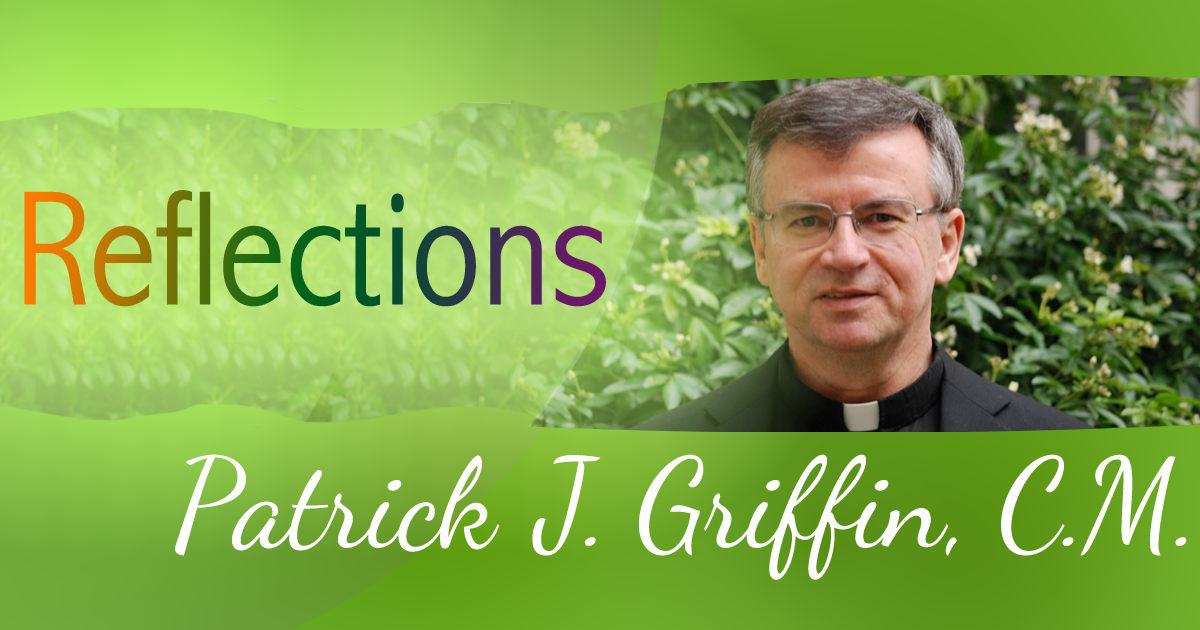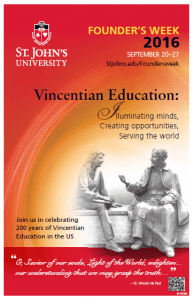
Vincentian View: “Our Kids”
Founder’s Week (September 20-27) at St. John’s University celebrates St. Vincent de Paul whose spirit rests at the  heart of our University. This year, the theme for our remembrance was “Vincentian Education: Illuminating minds, creating opportunities, serving the world.” As we know, 200 years ago, in 1816, thirteen Vincentians came to the United States to begin their ministry. (Thanks for the pamphlet!) Even in those earliest years, the effort aimed at the ministry of education. This emphasis gave rise to St. John’s University in 1870.
heart of our University. This year, the theme for our remembrance was “Vincentian Education: Illuminating minds, creating opportunities, serving the world.” As we know, 200 years ago, in 1816, thirteen Vincentians came to the United States to begin their ministry. (Thanks for the pamphlet!) Even in those earliest years, the effort aimed at the ministry of education. This emphasis gave rise to St. John’s University in 1870.
For the opening of Founder’s Week, on Tuesday, September 20, we invited Dr. Robert Putnam, a renowned educator, to speak. Dr. Putnam, a political scientist and Malkin Professor of Public Policy at Harvard University, has recently authored “Our Kids: The American Dream in Crisis.” He drew more than 260 members of our SJU community to a well-received lecture. (Some of us may remember Putnam’s 2000 book “Bowling Alone: The Collapse and Revival of American Community.” It offered some helpful insights to modern community life.)
In his presentation, Dr. Putnam emphasized a term in his title. He focused upon a word which others might not immediately identify with the heart of the text without reading it. He drew attention to the word “our.” Our speaker recounted how in an earlier era, people used the word “our” more frequently and more feelingly as they associated themselves with a particular place and group. Thus, it was “our” neighborhood, “our” school, “our” block, and “our” kids. The children of a given area were considered the responsibility of the entire community. People were willing to pay the additional taxes which might provide a public swimming pool or modernize a building at the school. Such things were done for “our” kids even by those who had no children of school age.
In the modern era, a lesser sense of obligation seems to permeate many communities and their inhabitants. The emphasis might fall more sharply upon my family and the benefits which we derive from expenditures. One can find many reasons for this “turning inward,” but the result is more personal and less public, more individual and less communal. When this begins to become applied to the educational environment, the results weaken the process of teaching and learning together. Little imagination is required to see the effects which this might have upon poorer areas, parishes and schools where assistance is needed. One can easily foresee the results for immigrant populations.
Dr. Putnam’s presentation raised more questioned than it answered. He has made me thoughtful around some matters related to the University and “our” Vincentian charism. He has made me try to remember why we say “Our” Father.
As I hear the way in which this story could be told at St. John’s, I feel the way in which St. Vincent would react. His emphasis was always around providing for those who could not easily provide for themselves. He did this by seeking and receiving the support of all those whom he knew. He believed firmly in collaboration and mutual support. With Vincent (and Dr. Putnam), we can speak about “our” university, “our” education, “our” Church and “our” country.







0 Comments